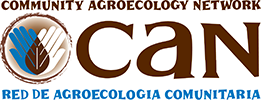 We know that land, seeds, and community organization are critical to building resilience and collective power in food systems.
We know that land, seeds, and community organization are critical to building resilience and collective power in food systems.
 We know that land, seeds, and community organization are critical to building resilience and collective power in food systems.
We know that land, seeds, and community organization are critical to building resilience and collective power in food systems.
 In a year of turmoil, CAN’s network has continued its work with
focus and resolve. Together with partner organizations we have built collective power by planting trees, recovering traditional medicines, and organizing to defend culture and home territories from the devastation of the agro-industrial economy. As the pandemic continues, we reaffirm our commitment to justice in the food system and we appreciate your solidarity. Will you stand with us today by investing in amplifying CAN’s work?
In a year of turmoil, CAN’s network has continued its work with
focus and resolve. Together with partner organizations we have built collective power by planting trees, recovering traditional medicines, and organizing to defend culture and home territories from the devastation of the agro-industrial economy. As the pandemic continues, we reaffirm our commitment to justice in the food system and we appreciate your solidarity. Will you stand with us today by investing in amplifying CAN’s work?
 Covid-19, climate change, and structural racism generated immense impacts throughout our network. In Mexico and Nicaragua, tropical storms and hurricanes wiped out crops and coffee cooperatives lost markets. The Mexican government’s relentless push to build the poorly-named Tren Maya, a mega-development project, threatens to displace indigenous farmers from their ancestral territories. In Watsonville, California, farmworkers and their families face disproportionate exposure to COVID, drought, and structural racism. Our long term work with, for and by migrant, indigenous and campesino communities guides our path forward.
Covid-19, climate change, and structural racism generated immense impacts throughout our network. In Mexico and Nicaragua, tropical storms and hurricanes wiped out crops and coffee cooperatives lost markets. The Mexican government’s relentless push to build the poorly-named Tren Maya, a mega-development project, threatens to displace indigenous farmers from their ancestral territories. In Watsonville, California, farmworkers and their families face disproportionate exposure to COVID, drought, and structural racism. Our long term work with, for and by migrant, indigenous and campesino communities guides our path forward.
- In Watsonville, Growing Justice youth, and partner Tierras Milperas, gather weekly to grow food, share meals and integrate youth into community governance over the use of urban agricultural land.
- Ka Kuxtal Much Mayej in Campeche, Mexico, inaugurated a Maya integrative health center that includes a network of medicinal plant gardens, placing health and healing in the hands of Maya campesino communities.
- The UCA San Rámon Producers Cooperative in Nicaragua coordinated across 18 communities the planting of shade trees, wind breaks and live fences building community resilience to climate change.
- The RIAC-Joven (International Youth Network) gathered youth in over 12 rural communities and 5 countries for a 2-day virtual Intercambio (exchange) on Indigenous People’s Day to make connections between land-based struggles.

Through each of these initiatives, CAN accompanies its partner organizations in youth and community-led actions that build the collective power and autonomy of each of these communities so they have access to a dignified life and food system.
We ask you to join us in making sure the communities in the CAN network continue to build their collective power throughout the pandemic and beyond. Every dollar donated by December 31st will be matched up to $50,000. You can make a difference and contribute to building the food system we need into the future. Donate today!
Sincerely,
Rose Cohen, Executive Director
and the CAN Team






